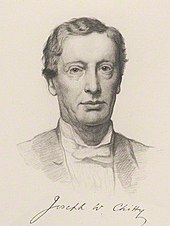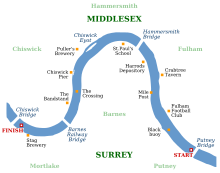The 4th Boat Race took place on the River Thames on 15 April 1840. It was the third of the University Boat Races to be held on the Thames, between Westminster Bridge and Putney Bridge. Oxford University Boat Club was formed to assist in the selection of the Oxford crew. Nevertheless, Cambridge won the race by three-quarters of a length to lead the overall record at 3–1.
The 7th Boat Race took place on the River Thames on 17 March 1845. The Boat Race is a side-by-side rowing race between crews from the Universities of Oxford and Cambridge. It was the first time the event was contested along The Championship Course, from Putney to Mortlake. The race was won by Cambridge who beat Oxford by a distance of ten lengths.
The 8th Boat Race between crews from the University of Oxford and the University of Cambridge took place on the River Thames on 3 April 1846. Umpired by Charles Jasper Selwyn, Cambridge won in a time of 21 minutes 5 seconds, with a winning margin of three lengths. The race was held on the ebb tide, starting in Mortlake and ending in Putney. For the first time, outriggers were used by both crews.
The 9th Boat Race took place on the River Thames on 29 March 1849. Typically held annually, the event is a side-by-side rowing race between crews from the Universities of Oxford and Cambridge. The race was won by Cambridge who triumphed over Oxford "easily". As a result of the nature of the defeat, Oxford challenged Cambridge to a second race that year, which was to be held in December, the only time the Boat Race was competed for twice in a calendar year. Every member of the Cambridge crew came from Trinity College.
The 11th Boat Race took place on the River Thames on 3 April 1852. Typically held annually, the event is a side-by-side rowing race between crews from the Universities of Oxford and Cambridge. Former Cambridge cox Thomas Selby Egan coached Oxford, the first time that either crew had been trained by a member of the opposing university. The race was won by Oxford, their first Boat Race victory at Easter, who triumphed over Cambridge by nine lengths.
The 12th Boat Race took place on the River Thames on 8 April 1854. Typically held annually, the event is a side-by-side rowing race between crews from the Universities of Oxford and Cambridge. The race was won by Oxford who triumphed over Cambridge by seven lengths.
The 13th Boat Race took place on the River Thames on 15 March 1856. Typically held annually, the event is a side-by-side rowing race between crews from the Universities of Oxford and Cambridge. The race, the second to be held on the ebb tide, was won by Cambridge who beat Oxford by half a length.
The 15th Boat Race took place on the River Thames on 27 March 1858. Typically held annually, the event is a side-by-side rowing race between crews from the Universities of Oxford and Cambridge. The 1858 race, disrupted by poor rowing and a collision with a barge, was won by Cambridge, who defeated Oxford by 7+1⁄2 lengths in a time of 21 minutes 23 seconds.
The 17th Boat Race took place on 31 March 1860. Held annually, the Boat Race is a side-by-side rowing race between crews from the Universities of Oxford and Cambridge along the River Thames. It was the first time in the history of the event that the race had to be restarted as a result of an obstruction. Cambridge won the event by one length, in the slowest time ever.
The 18th Boat Race took place on the River Thames on 16 March 1861. Held annually, The Boat Race is a side-by-side rowing race between crews from the Universities of Oxford and Cambridge. The 1861 event, which featured the first ever non-British competitor, suffered numerous interruptions from river traffic. Oxford won by 16 lengths.
The 19th Boat Race between crews from the University of Oxford and the University of Cambridge took place on the River Thames on 12 April 1862. Oxford won by 10 lengths in a time of 24 minutes and 34 seconds, taking the overall record to 10–9 in Cambridge's favour.
The 20th Boat Race between crews from the University of Oxford and the University of Cambridge took place on the River Thames on 28 March 1863. Oxford won by 15 lengths in a time of 23 minutes 6 seconds. It took the overall record to ten wins each, the first time since the 1836 race that the scores were level. The race was the third to be held on the ebb tide, along the Championship Course in reverse, from Mortlake to Putney. It was the first time since the race was held in the fashion since the 1856 race.
The 21st Boat Race, an annual side-by-side rowing race between crews from the Universities of Oxford and Cambridge along the River Thames, took place on 14 March 1864. Umpired by Joseph William Chitty, Oxford won by nine lengths in a time of 21 minutes 4 seconds, the fastest winning time since the event was held on The Championship Course in 1845. The race, whose start was moved in order to avoid interruptions from river traffic, was witnessed by the Prince of Wales.
The 22nd Boat Race between crews from the University of Oxford and the University of Cambridge took place on the River Thames on 8 April 1865. Oxford won by four lengths in a time of 21 minutes 24 seconds. The race, described as "one of the most sensational races in this history" thus far, was umpired by Joseph William Chitty. It was the first time that a crew had won the Boat Race after being behind at Hammersmith Bridge.
The 23rd Boat Race took place on the River Thames on 24 March 1866. The Boat Race is a side-by-side rowing race between crews from the Universities of Oxford and Cambridge. Oxford won by three lengths in a time of 25 minutes and 35 seconds, one of the slowest times in the history of the event.
The 24th Boat Race between crews from the University of Oxford and the University of Cambridge took place on the River Thames on 13 April 1867. In a race where the lead was exchanged several times, Oxford won by half a length in a time of 22 minutes and 39 seconds. The victory took the overall record to 14–10 in Oxford's favour.
The 25th Boat Race between crews from the University of Oxford and the University of Cambridge took place on the River Thames on 4 April 1868. Oxford won by six lengths in a time of 20 minutes and 56 seconds, taking the overall record to 15–10 in their favour. Oxford cox Charles Tottenham became the first person in the history of the event to win five Boat Races, and Cambridge saw their first non-British rower compete.
The 26th Boat Race between crews from the University of Oxford and the University of Cambridge took place on the River Thames on 17 March 1869. Oxford won by three lengths in a time of 20 minutes and 4 seconds. It was their ninth consecutive victory and was, at that point, the fastest time ever recorded in the event.
The 55th Boat Race took place on 24 March 1898. Held annually, the Boat Race is a side-by-side rowing race between crews from the Universities of Oxford and Cambridge along the River Thames. Oxford, the reigning champions and leading overall, went into the race with a marginally heavier crew than Cambridge. They won "easily" as Cambridge's boat became waterlogged in strong winds and inclement conditions. It was their ninth consecutive victory and took them to an overall lead of 32–22 in the event. The winning time of 22 minutes 15 seconds was the slowest since the 1878 race.
The 36th Boat Race took place on 5 April 1879. The Boat Race is an annual side-by-side rowing race between crews from the Universities of Oxford and Cambridge along the River Thames. Each crew contained four Blues. In a race umpired by former Oxford rower Joseph William Chitty, Cambridge led all the way, and won by a margin of three lengths in a time of 21 minutes 18 seconds. The victory took the overall record to 18–17 in Oxford's favour.




